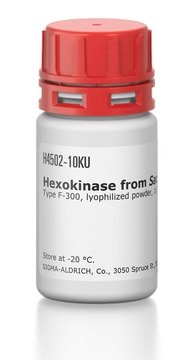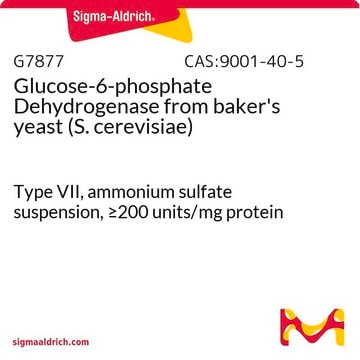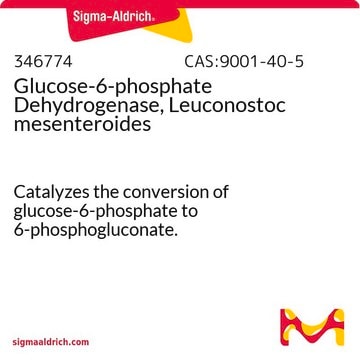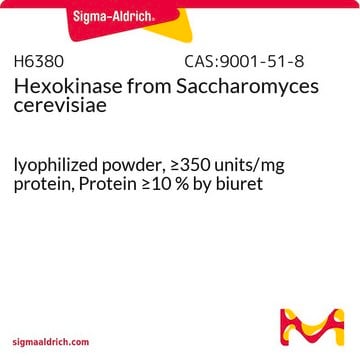G4134
Glucose-6-phosphate Dehydrogenase from baker′s yeast (S. cerevisiae)
Type IX, lyophilized powder, 200-400 units/mg protein (modified Warburg-Christian)
Synonym(s):
G-6-P-DH, Zwischenferment
Sign Into View Organizational & Contract Pricing
All Photos(1)
About This Item
Recommended Products
type
Type IX
Quality Level
form
lyophilized powder
specific activity
200-400 units/mg protein (modified Warburg-Christian)
mol wt
128 kDa
β-NADP and β-NADPH content
≤10 mmol/mol
application(s)
agriculture
shipped in
dry ice
storage temp.
−20°C
Looking for similar products? Visit Product Comparison Guide
Related Categories
General description
Research area: Cell Signaling
Glucose-6-phosphate dehydrogenase (G6PD) is a key metabolic enzyme of the pentose phosphate pathway. In S. cerevisiae, it is encoded by the ZWF1 gene. G6PD exists as a tetramer in its active form.
Glucose-6-phosphate dehydrogenase (G6PD) is a key metabolic enzyme of the pentose phosphate pathway. In S. cerevisiae, it is encoded by the ZWF1 gene. G6PD exists as a tetramer in its active form.
Application
Glucose-6-phosphate dehydrogenase is used:
- To test ketose reductase activity in developing maize endosperm.
- For recycling microassay of β-NADP and β-NADPH.
- To measure the intracellular levels of NADPH and total NADP.
- To measure the nicotinamide adenine dinucleotide (NAD) kinase kinetic assay activity.
Biochem/physiol Actions
Glucose-6-phosphate dehydrogenase catalyzes the conversion of glucose-6-phosphate to 6-phosphogluconolacetone as the first step in the pentose phosphate pathway.
Glucose-6-phosphate dehydrogenase catalyzes the rate-limiting step in the pentose phosphate pathway. Its function involves the conversion of glucose-6-phosphate to 6-phosphogluconolacetone while generating NADPH, which is essential for the regeneration of glutathione The glutathione system utilizes nicotinamide adenine dinucleotide phosphate hydrogen (NADPH) to effectively eliminate excess hydrogen peroxide. Glucose-6-phosphate dehydrogenase (G6PD) plays an important role in regulating cell growth and survival. Their levels are higher in cells undergoing normal and neoplastic growth. Increased glucose-6-phosphate dehydrogenase activity plays a pivotal role in preventing reactive oxygen species mediated cell death. Glucose-6-phosphate dehydrogenase is over expressed in several cancers whereas its activity is reduced in hyperglycemia. A deficiency in glucose-6-phosphate dehydrogenase causes hemolysis.
Unit Definition
One unit will oxidize 1.0 μmole of D-glucose 6-phosphate to 6-phospho-D-gluconate per min in the presence of NADP at pH 7.4 at 25 °C.
Physical form
Lyophilized powder essentially sulfate-free, containing approx. 20% sodium citrate
Signal Word
Danger
Hazard Statements
Precautionary Statements
Hazard Classifications
Resp. Sens. 1
Storage Class Code
11 - Combustible Solids
WGK
WGK 3
Flash Point(F)
Not applicable
Flash Point(C)
Not applicable
Personal Protective Equipment
dust mask type N95 (US), Eyeshields, Gloves
Choose from one of the most recent versions:
Certificates of Analysis (COA)
Lot/Batch Number
Don't see the Right Version?
If you require a particular version, you can look up a specific certificate by the Lot or Batch number.
Already Own This Product?
Find documentation for the products that you have recently purchased in the Document Library.
Customers Also Viewed
D Oh et al.
Molecular and cellular biology, 10(4), 1415-1422 (1990-04-01)
The Saccharomyces cerevisiae GAL5 (PGM2) gene was isolated and shown to encode the major isozyme of phosphoglucomutase. Northern (RNA) blot hybridization revealed that the GAL5 transcript level increased three- to fourfold in response to galactose and was severely repressed in
Revealing the allosterome: systematic identification of metabolite-protein interactions
Orsak T, et al.
Biochemistry, 51(1), 225-232 (2012)
The Pentose Phosphate Pathway in Yeasts-More Than a Poor Cousin of Glycolysis
Bertels LK, et al.
Biomolecules, 11(5), 725-725 (2021)
The global prevalence of glucose-6-phosphate dehydrogenase deficiency: A systematic review and meta-analysis
Nkhoma ET and Poole C
Blood Cells, Molecules and Diseases, 42, 267?278-267?278 (2009)
Impact of glucose-6-phosphate dehydrogenase deficiency on the pathophysiology of cardiovascular disease
Hecker PA, et al.
American Journal of Physiology. Heart and Circulatory Physiology, 304(4), H491-H500 (2013)
Our team of scientists has experience in all areas of research including Life Science, Material Science, Chemical Synthesis, Chromatography, Analytical and many others.
Contact Technical Service













